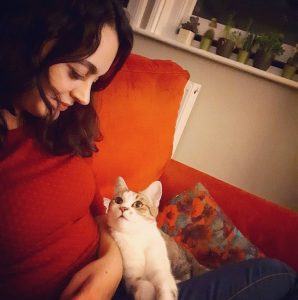The RSPCA is encouraging pet owners to think about how they will care for their animals if they need to stay at home with suspected symptoms of coronavirus.
The latest Government guidance advises everyone to carry out ‘social distancing’ in order to stop the spread of coronavirus and protect vulnerable members of the community.
As a result of this advice the Government has said that people can go out for a walk if they stay two metres away from people.
RSPCA animal welfare expert Dr Samantha Gaines said: “There’s no evidence to suggest that pets can be carriers of coronavirus or can become ill from it themselves. We would urge pet owners not to panic and to not abandon their pets.

“The latest ‘social distancing’ advice does not have a huge impact on pet owners, but dog walkers do need to follow Government advice and keep two meters away from others while they are out for a stroll.”
She added: “Pet owners who are not showing any signs of coronavirus themselves or living with anyone who has symptoms should continue to interact with their pets but adopt good hygiene practices including washing hands thoroughly with soap and water before and after touching them, their food, toys and bedding.
“This is good advice at any time and not specific to the Coronavirus situation. Avoid being kissed or licked and sharing food with your pet.”
Social distancing tips for keeping your pets and family safe
Always adopt good hygiene practises and thoroughly wash your hands after interacting with your pets, such as rabbits, rodents, birds and reptiles.
Avoid being kissed or licked and sharing food with your pet.
Ensure you have supplies of pet food and medication in case of you need to stay at home.
Enjoy dog walks but keep two meters away from other people
Speak to your vet or doctor for more advice.
Stay at home advice
The charity encouraged pet owners to think about how they can care for their animals if they need to ‘stay at home’ if they or a member of the household show symptoms of the virus.
Sam added: “As well as the good hygiene measures, pet owners should try and ensure you have supplies of pet food and medication if you need to ‘stay at home’ and speak to your vet or doctor for more advice.
“If you own a horse or livestock and keep them on land that is not based at your address, arrange for a friend to care for them until you’re able to return to normal. If possible, arrange for another person to care for your pet (you could consider using a dog walker or home boarder).
Additional guidance for people staying at home with suspected coronavirus:
Limit contact with pets and other animals while you are sick
Do not go on dog walks, instead exercise your dog in the garden or ask a friend or relative to help. A dog walker or boarder may also be able to help.
Ask friends to care for livestock and horses
If you feel unwell ask friends or a boarder to take your pets to be looked after
If you have any concerns about your pet or your pet shows signs of ill health, please do not visit the vet but phone for advice. As you will be unable to take your pet to the vet yourself, have a plan so that someone else can do this on your behalf.
Sam added: “It’s so heartening to see people rallying round to support each other at these difficult times, we’d encourage anyone who needs help to ask for it, from friends, neighbours and charities.
“One positive to come out of this is people will be working from home and spending extra time with their pets which is a great opportunity to try some new games.”
Tips for keeping dogs happy
Mental stimulation is a great way to keep your dog entertained and occupied so you can keep your dog happy by replacing exercise with other activities until you are able to take them back out for their usual walks.
Try challenging your pooch at tea time – ditch the food bowl and feed Fido using a Kong or a food puzzle to get them thinking.
Play, play, play! Most dogs love to play so set aside some time to have a good game of fetch or tug with your pooch.
Learning a new trick or command is great mental stimulation for a dog. Get out their favourite treats and try teaching Fido how to wave his paw, ‘sit’, ‘lie down’, or ‘roll-over’.
Get him sniffing – scent work can be a great way to keep them busy for ages! Hide treats around the garden or around the house and send them off in search of them. If you feed your dog kibble this can be a great way to serve them their meals!
Remember toilet breaks – remember your dog will still need to go outside to use the toilet so make sure they get regular access to the garden to potter, sniff and wee.



 Posted on 18th Mar
Posted on 18th Mar


